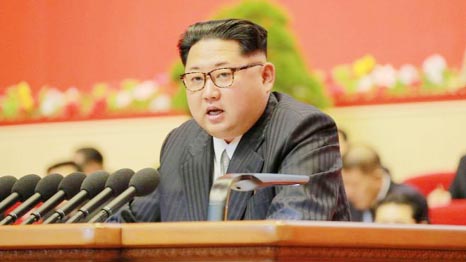
BBC Online :
The leader of North Korea has said the country will not use nuclear weapons unless its sovereignty is threatened, state media report.
North Korea first tested nuclear weapons in 2006, after withdrawing from an international treaty.
It has made repeated threats of nuclear strikes against South Korea and the US.
But Kim Jong-un reportedly told the Workers’ Party Congress in Pyongyang that he is willing to normalise ties with previously hostile countries.
A BBC correspondent in North Korea says Mr Kim tends to send mixed messages and movement observed at the country’s nuclear site is consistent with preparations for another nuclear test.
State media quoted Mr Kim as saying there should be more talks with South Korea to build trust and understanding.
And he said the country would “faithfully fulfil its obligation for non-proliferation and strive for global denuclearisation”.
The meeting is the first congress of North Korea’s ruling party since 1980.
Mr Kim is the supreme leader of North Korea.
The KCNA news agency reported him as saying: “As a responsible nuclear weapons state, our Republic will not use a nuclear weapon unless its sovereignty is encroached upon by any aggressive hostile forces with nukes.”
He said the government would “improve and normalise the relations with those countries which respect the sovereignty of the DPRK and are friendly towards it, though they had been hostile toward it in the past”.
North Korea withdrew from the nuclear non-proliferation treaty in 2003 and started testing nuclear weapons three years later.
International sanctions on the country were tightened in March this year after it claimed to have tested a hydrogen bomb and launched a missile into space.
They include export bans on materials used in nuclear and military production as well as restrictions on luxury goods and banking.
His remarks on Saturday, the second day of the congress, came amid growing concerns that the North might be on the verge of conducting a fifth nuclear test.
Kim had opened the congress with a defiant defence of the nuclear weapons programme, praising the “magnificent… and thrilling” test of what Pyongyang claimed was a powerful hydrogen bomb on January 6.
But his report to the conclave on Saturday stressed that North Korea was also a “responsible nuclear weapons state” with an arsenal built for deterrence.
“Our republic will not use a nuclear weapon unless its sovereignty is encroached upon by any aggressive hostile forces with nukes,” he said, according to an English translation of his speech by the North’s official KCNA news agency.
That formula would appear to allow for the use of nuclear weapons against a conventional attack by a nuclear power, but the Korean-language version made it clear that the scenario involved an actual nuclear attack.
The leader of North Korea has said the country will not use nuclear weapons unless its sovereignty is threatened, state media report.
North Korea first tested nuclear weapons in 2006, after withdrawing from an international treaty.
It has made repeated threats of nuclear strikes against South Korea and the US.
But Kim Jong-un reportedly told the Workers’ Party Congress in Pyongyang that he is willing to normalise ties with previously hostile countries.
A BBC correspondent in North Korea says Mr Kim tends to send mixed messages and movement observed at the country’s nuclear site is consistent with preparations for another nuclear test.
State media quoted Mr Kim as saying there should be more talks with South Korea to build trust and understanding.
And he said the country would “faithfully fulfil its obligation for non-proliferation and strive for global denuclearisation”.
The meeting is the first congress of North Korea’s ruling party since 1980.
Mr Kim is the supreme leader of North Korea.
The KCNA news agency reported him as saying: “As a responsible nuclear weapons state, our Republic will not use a nuclear weapon unless its sovereignty is encroached upon by any aggressive hostile forces with nukes.”
He said the government would “improve and normalise the relations with those countries which respect the sovereignty of the DPRK and are friendly towards it, though they had been hostile toward it in the past”.
North Korea withdrew from the nuclear non-proliferation treaty in 2003 and started testing nuclear weapons three years later.
International sanctions on the country were tightened in March this year after it claimed to have tested a hydrogen bomb and launched a missile into space.
They include export bans on materials used in nuclear and military production as well as restrictions on luxury goods and banking.
His remarks on Saturday, the second day of the congress, came amid growing concerns that the North might be on the verge of conducting a fifth nuclear test.
Kim had opened the congress with a defiant defence of the nuclear weapons programme, praising the “magnificent… and thrilling” test of what Pyongyang claimed was a powerful hydrogen bomb on January 6.
But his report to the conclave on Saturday stressed that North Korea was also a “responsible nuclear weapons state” with an arsenal built for deterrence.
“Our republic will not use a nuclear weapon unless its sovereignty is encroached upon by any aggressive hostile forces with nukes,” he said, according to an English translation of his speech by the North’s official KCNA news agency.
That formula would appear to allow for the use of nuclear weapons against a conventional attack by a nuclear power, but the Korean-language version made it clear that the scenario involved an actual nuclear attack.

